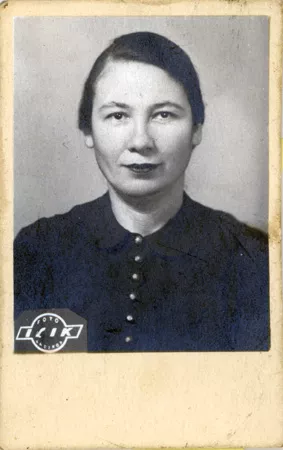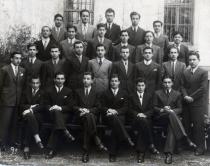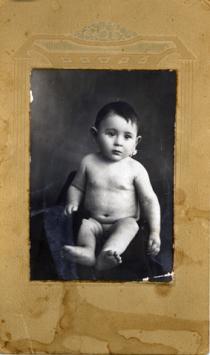My mother
Here is my mother Fortüne Arditi. Maiden name Saranga. She was a serious and trustworthy woman. She managed our home affairs, and was our family's permanent counsel. She was the first person whose advice everyone in the family requested. Not only did she observe events with an objective perspective, but she also had the ability to reconcile people's differences with her compromising tone. She could always get others to do what she wanted, and she was the one who got the family together. During the holidays, our house would be always be full to the brim. My mother had five siblings. Yuda Leon Saranga immigrated to the United States in 1912, when he was 14. He started working in a factory there. He later became a trade-union chief, and married his wife Suzan. They had a son named Aron. In 1953, Yuda Leon Saranga and his family came back to Istanbul by ship. His wife was originally from Canakkale. [the Dardanelles] On the night the ship passed through the Bosphorus, they did not sleep all night long because they were so excited to see the city of their ancestors even if it was from a distance. When my grandmother Sultana Suzan Saranga saw her son after all this time, she raised her hands towards the sky and cried "Atyo Santo" [Ladino exclamation for "my dear God"]. It must have been extremely unnerving and exciting for her to see her son at 40 years of age because he was only 14 when he left the country. The ship they traveled on was an Italian vessel. Yuda did not eat much at the beginning of the journey because he thought there might be pork in the food served on the ship. Later on, he became very close to the entire crew, and had them cook him a nice, hearty dish of pasta. When the journey ended, he and the chief police officer left the ship arm in arm.
My mother's sister, Sara Saranga, later changed her last name to 'Kohen.' She gave birth to two children named Besim and Erol. Both of them are living in Israel today. For the longest time, they operated a toy business. Erol's wife's name is Teri Adut, and Besim's is Zizi.
Her other brother, Salamon Saranga married Simbul Mizrahi, and they lived in Balat for a long time. They never had children. Beki Saranga married Izak Argun. They had two children named Rozi and Albert. Rozi is living in Israel today, and Albert is in Istanbul.
How my parents first met could be considered romantic. My father had a walking stick; it was fashionable to use one then. Kooperatif had a franchise store on the European coast of Istanbul, where my father worked for a while. He used to take the tram to get to and from work, and would frequently see my mother in the tram. One day, soon after my mother got off the tram, he dropped his walking stick right in front of her, and that is how they first met.
In those years, the general convention in the society stipulated that dating was a serious matter, and others expected relationships to result in marriage after a short dating period. My mother's father had already passed away. My father, also a kid at the time, had lost both of his parents. La Tia Dudu (Aron Saranga's sister), who was taking care of my father at the time, was knowledgeable in matters of love and marriage. She asked him "Are you going to marry her?" "Yes, I will" my father replied. Not long after that, my parents got married at the Ortakoy Synagogue.
My mother was a very elegant woman; she went grocery shopping in elegant shoes and clothing. She had her clothes tailor-made. These tailors generally happened to be non-Muslims. My mother had her hair cut when she was a teenager, but after a certain age, I never remember her with short hair. She would always wear her hair in a bun.
She had a beautiful collection of jewelry. Back then, Russian merchants sold Russian-style jewelry, and my father bought these for my mother. She later on gave her jewelry to my sister as a gift.
My mother went grocery shopping every morning, because my father ate lunch at home. Lunch was considered the most important meal in our family. My mother had a very good eye for meat and poultry because of her father; who had owned a butcher shop. I remember going to the butcher's with my mother once to buy some meat. The butcher placed a piece of meat on the counter, but immediately rescinded after seeing the look on my mother's face.
My mother was a helper, but she did this confidentially. I remember going to a government office once after she died. One of the ladies who worked there asked me if I knew my mother. I responded "Of course, I do." But, she said "Not only you, but people like us who received so much support from her know your mother too, and we will always remember her." I never found out what kind of support my mother had provided to this lady.
Although she had a tranquil-natured personality, my mother was still a 'Saranga.' Like every Saranga, she occasionally flared up in anger. But, she never yelled at her children. In any case, my sister, Viki, was the mascot or the princess of our house.
My mother usually directed her anger at my father because he did not always take the best care of his health. The religious holidays were also a problematic subject between them. Since my mother was the elder of her family, she usually invited everyone else over. However, she would drive herself to exhaustion during the first night of the Holidays because she did not have support staff that helped her with grocery shopping or cooking. We would always tell her that we did not want this much food and in this variety, and that all we wanted was to see her at the dinner table on the first night of the celebrations. She would not understand though. Holidays meant food, and that equaled my mother being sick - and, of course, crowded dinner tables. Her tapadas were the best.































